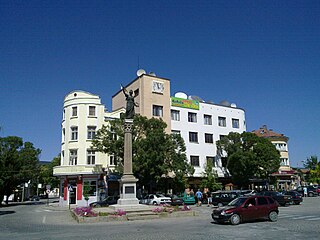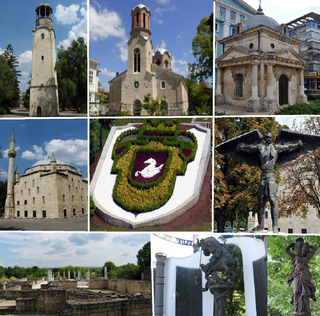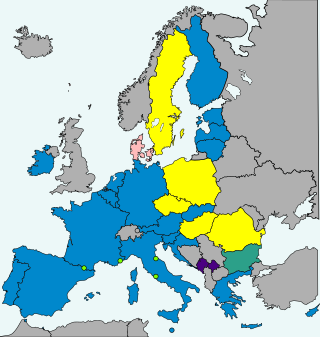
Bulgaria, officially the Republic of Bulgaria, is a country in Southeast Europe. It is situated on the eastern portion of the Balkans directly south of the Danube river and west of the Black Sea. Bulgaria is bordered by Greece and Turkey to the south, Serbia and North Macedonia to the west, and Romania to the north. It covers a territory of 110,994 square kilometres (42,855 sq mi) and is the sixteenth-largest country in Europe. Sofia is the nation's capital and largest city; other major cities include Burgas, Plovdiv, and Varna.

The economy of Bulgaria functions on the principles of the free market, having a large private sector and a smaller public one. Bulgaria is an industrialised high-income country according to the World Bank, and is a member of the European Union (EU), the World Trade Organization (WTO), the Organization for Security and Co-operation in Europe (OSCE) and the Organization of the Black Sea Economic Cooperation (BSEC). The Bulgarian economy has experienced significant growth (538%), starting from $13.15 billion and reaching estimated gross domestic product (GDP) of $107 billion or $229 billion, GDP per capita of $36,000, average gross monthly salary of 2,310 leva, and average net monthly salary of $2,191. The national currency is the lev, pegged to the euro at 1.95583 leva for 1 euro. The lev is the strongest and most stable currency in Eastern Europe.

Uzbekistan joined the Commonwealth of Independent States in December 1991. However, it is opposed to reintegration and withdrew from the CIS collective security arrangement in 1999. Since that time, Uzbekistan has participated in the CIS peacekeeping force in Tajikistan and in United Nations-organized groups to help solve the Tajik and Afghan conflicts, both of which it sees as posing threats to its own stability. Uzbekistan is an active supporter of U.S. efforts against worldwide terrorism and joined the coalitions which have dealt with both Afghanistan and Iraq. It is a member of the United Nations, the Euro-Atlantic Partnership Council, Partnership for Peace, and the Organization for Security and Cooperation in Europe (OSCE). It belongs to the Organisation of Islamic Cooperation (OIC) and the Economic Cooperation Organization, which comprises 7 Central Asian countries: Pakistan, Uzbekistan, Kazakhstan, Turkmenistan, Afghanistan, Kyrgyzstan and Tajikistan. It is a founding member of and remains involved in the Central Asian Union, formed with Kazakhstan and Kyrgyzstan, joined in March 1998 by Tajikistan.

Transnistria, officially known as the Pridnestrovian Moldavian Republic and locally as Pridnestrovie, is a breakaway state internationally recognized as part of Moldova. It controls most of the narrow strip of land between the Dniester river and the Moldova–Ukraine border, as well as some land on the other side of the river's bank. Its capital and largest city is Tiraspol. Transnistria is officially designated by the Republic of Moldova as the Administrative-Territorial Units of the Left Bank of the Dniester or as Stînga Nistrului.

Sevlievo is a town in north-central Bulgaria, part of Gabrovo Province. Sevlievo is known as one of the wealthiest towns in Bulgaria owing to the well developed local economy, high employment rate and major foreign investments, such as the Ideal Standard Companies factory. It is the administrative centre of the homonymous Sevlievo Municipality.

Sofia Airport is the main international airport of Bulgaria, located 10 km (6.2 mi) east of the centre of the capital Sofia. In 2019 the airport surpassed 7 million passengers for the first time. The airport serves as the home base for BH Air, Bulgaria Air, European Air Charter and GullivAir, and as a base for both Ryanair and Wizz Air. The airport also houses the Bulgarian Air Force's Vrazhdebna Air Base.

Lesbian, gay, bisexual, and transgender (LGBT) people in Bulgaria face significant challenges not experienced by non-LGBT residents. Both male and female same-sex relationships are legal in Bulgaria, but same-sex couples and households headed by same-sex couples are not eligible for the same legal protections available to opposite-sex couples. Discrimination on the basis of sexual orientation has been banned since 2004, with discrimination based on "gender change" being outlawed since 2015. In July 2019, a Bulgarian court recognized a same-sex marriage performed in France in a landmark ruling. For 2020, Bulgaria was ranked 37 of 49 European countries for LGBT rights protection by ILGA-Europe. Like most countries in Central and Eastern Europe, post-Communist Bulgaria holds socially conservative attitudes when it comes to such matters as homosexuality and transgender people.

Razgrad is a city in Northeastern Bulgaria in the valley of the Beli Lom river that falls within the historical and geographical region of Ludogorie (Deliorman). It is an administrative center of Razgrad Province.

Bulgaria plans to adopt the euro and become the 21st member state of the eurozone. The Bulgarian lev has been on a currency board since 1997, with a fixed exchange rate initially against the Deutsche Mark and subsequently its replacement the euro. Bulgaria's target date for introduction of the euro was 1 January 2025. However, the 2024 ECB convergence report concluded that Bulgaria did not meet the convergence criteria due to high inflation, so this timeline has been delayed. The Bulgarian National Bank and several Bulgarian politicians have expressed their desire to join as soon as possible, and project that inflation will be low enough by the end of 2024. If Bulgaria adopts the euro, it will become the second national currency of the country after the lev, which was introduced over 140 years ago. The fixed exchange rate is 1.95583 lev for 1 euro.
Kapitan Andreevo is a village near the Bulgaria—Turkey—Greece tripoint in Svilengrad municipality, Haskovo Province, southern Bulgaria. As of 2005 it has 948 inhabitants and the mayor is Dimitar Shiderov. Due to the proximity with Turkey, there is a major border checkpoint built there, with the Turkish side of the checkpoint being called Kapıkule. The busy Bulgaria–Turkey border crossing at Kapitan Andreevo is an important point of entrance to the European Union. Kapitan Andreevo is located at 41°43′N26°19′E, 30 metres above sea level.

Nesebar is a Bulgarian municipal association football club based in Nesebar, Burgas Province, currently competing in the Second League, the second tier of Bulgarian football.

The Bulgarians in Albania live mostly in the areas of Mala Prespa, Gollobordë and Gora. Ethnic identity can be fluid among Albania's Slavophonic population, who might identify as Albanian, Bulgarian or Macedonian, depending on the circumstances. Between 2001 and 2016, around 4,470 Albanian nationals applied for a Bulgarian citizenship and over 2,600 of them were granted one. The Bulgarian minority was recognized by the Albanian government in October 2017. In the 2023 Albania census, 7,057 people declared themselves to be Bulgarians making them the largest Slavophone population in Albania.

The accession of North Macedonia to the European Union has been on the current agenda for future enlargement of the EU since 2005, when it became an official candidate for accession. The then Republic of Macedonia submitted its membership application in 2004, thirteen years after its independence from Yugoslavia. It is one of nine current EU candidate countries, together with Albania, Bosnia and Herzegovina, Georgia, Moldova, Montenegro, Serbia, Turkey and Ukraine.

Kristalina Ivanova Georgieva-Kinova is a Bulgarian economist serving as the 12th managing director of the International Monetary Fund since 2019, and the first person from an emerging market economy to lead the institution. Born in Sofia, her university education was at London School of Economics (LSE), followed by a return to her native Bulgaria where she witnessed some of the economic hardships of the post-Communist transition. She began her career by teaching economics, becoming a prominent figure in the field.

Žeravino or Zheravino is a divided village in easternmost Serbia and westernmost Bulgaria. The Bulgarian half of the village is part of Kyustendil municipality, Kyustendil Province, whereas the Serbian part belongs to Bosilegrad municipality, Pčinja District.

Birsent Hamdi Karagaren is a Bulgarian professional footballer who plays as a winger for CSKA 1948 and the Bulgaria national team. He made his debut for his country in October 2019.

Corruption in Bulgaria has decreased in recent years, after a series of reforms implemented through EU guidance. Among recent improvements, amendments to the constitution in 2015 brought about a reform of the Supreme Judicial Council and a stronger judicial inspectorate. Furthermore, the broader legislative framework has seen a number of reforms over the years, in particular through the amendments of the Judicial System Act in 2016 and of the Criminal Procedure Code in 2017.

Revival is a far-right and ultranationalist political party in Bulgaria, founded in August 2014. Its chairman is Kostadin Kostadinov. The party is characterised by various analysts and media as pro-Russian, anti-EU, anti-NATO, anti-American, being opposed to COVID-19 vaccinations and spreading anti-vaccine and anti-LGBT rhetoric.
Peter Bojkov Vitanov is a Bulgarian politician and member of the Bulgarian Socialist Party who served as Member of the Ninth European Parliament.

The COVID-19 vaccination in Bulgaria is an immunization campaign currently taking place against SARS-CoV-2, the virus that is the cause of the COVID-19 disease. It began on 27 December 2020, in line with most other countries in the EU, and is in response to the ongoing pandemic in Bulgaria. The vaccination drive was affected by organizational and supply-related issues during the initial months while since the spring of 2021 vaccine hesitancy has contributed significantly to the country having the lowest rate of inoculations in the EU, with 35% of Bulgaria's adult citizens, and 30% of its eligible population, fully vaccinated by May 2022.


















